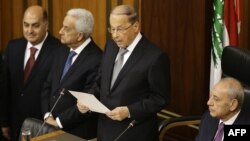Lebanese President Michel Aoun suspended a parliamentary session for a month on Wednesday, temporarily blocking proposed plans to extend parliament's term for the third time in a row since 2013.
Parliament was expected to vote on Thursday to extend its own mandate again until 2018 without an election, officials said. Current lawmakers were elected in 2009 for what was meant to be four-year terms.
Activists had called for protests against the extension, which they decried as a blow to democracy. The two previous extensions triggered massive protests in central Beirut.
In a televised address to the nation, Aoun said the delay would give politicians more time to agree on a new electoral law and help protect the Lebanese people's right to vote.
"To allow for more communication between all the parties ... I have decided to postpone the parliamentary session for one month based on article 59 of the Lebanese constitution," Aoun said.
Lebanon's main political parties have been unable to agree on a new electoral law for years. Parliament has already extended its own mandate twice since 2013, a move that critics including the European Union have condemned as unconstitutional.
Most political parties have rejected holding parliamentary elections based on the existing system, a sectarian-based electoral law that dates back to 1960.
The next round of elections had previously been scheduled for May.
Some politicians say the law divides up the country's population into constituencies that do not fairly represent the sectarian political preferences of their supporters. Christian lawmakers have been the most vocal in demanding a new law.
Lebanese politics have long been dogged by sectarian divisions, with the war in neighboring Syria exacerbating party rivalries. The government has long struggled to make basic decisions and institutional paralysis often plagues parliament.
Regional rivalry between Iran and Saudi Arabia has also complicated Lebanon's sectarian divisions.
Critics and activists accuse Lebanese politicians of using regional upheaval as an excuse to dodge elections.
Parliament elected former army commander Aoun in October, ending a 29-month presidential vacuum in a political deal that secured victory for his Lebanese Shi'ite ally Hezbollah, Iran and Syria.
Aoun become head of state in a power-sharing deal that saw Saad al-Hariri, Lebanon's leading Sunni Muslim politician, appointed premier in a unity cabinet including nearly all Lebanon's main parties.









